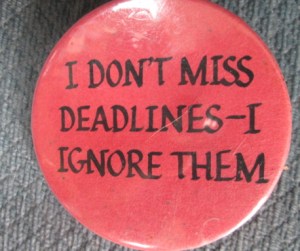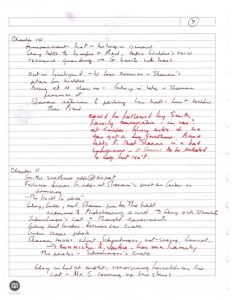Most of my writing time over last weekend went into an 1,800-word review of a nonfiction book. Monday was the deadline, and Monday I emailed it in to my editor. Editors love it when writers deliver their stuff on time. Trust me on this. They also love it when writers turn in copy that’s well organized and properly punctuated. Trust me on that too.
I’ve done plenty of reviewing over the years, mostly of books but also of local theater performances and the occasional concert or album. Reviewing is hands-down the hardest writing I ever do, which is why I don’t do much of it these days. My other writing has pushed it to the side. I regret this because I think reviewing is important and because I’m pretty good at it.
Reviewing is important. An author or performer puts the work out there, and the reviewer enters into conversation with it — a conversation that includes not only the work and its creator(s) but also the potential audience for that work.
Perhaps most important, reviews let prospective readers know that a book is out there and whether they might be interested in it.
So a review is like PR — free publicity for the book?
In some ways yes, but in other ways very much no. What reviewers write can persuade people to buy the book, but we aren’t part of the production team. Our job is not to persuade people to buy the book or put it on their to-read lists. Our job is to help them make up their minds.
What distinguishes reviews from back-cover blurbs and other promotional copy is that reviewers come to the work from outside. We haven’t been involved in the writing, editing, publishing, or promoting of the book we’re reviewing.
So what’s a review anyway?
Good question! “Review” covers the vast territory between a blurb and the kind of literary criticism that appears in academic journals. A review can be short, long, or somewhere in-between. It can be written down or delivered orally. Usually it describes what the book is about, provides some context — for instance, mentioning the author’s previous works, if any, or recent publications in the same field — and offers some clues as to whether the book is worth your while or not.
Beyond that, it depends — on the reviewer, the review medium (radio, blog, webzine, newspaper, Goodreads, Amazon, etc.), and the intended audience.
My writer friend wants me to review her book. Should I do it?
No. A thousand times no.
Personally I think your writer friend shouldn’t even have asked you. She’s putting you in a terrible position.
Since you’re in that terrible position, ask yourself these questions:
- Can I tell prospective readers what they deserve to know about this book before they buy it?
- If I give my honest opinion about my writer friend’s book, will we still be friends?
Of course, if you decline to review the book, the friendship may hit the skids anyway — see what I mean about terrible positions?
If you’re the writer with a forthcoming book, don’t do this to your friends. If your friends write well and want to help out, enlist them to write jacket copy, press releases, and brief synopses for your website. If they’re published authors themselves or have other useful credentials, they can write one of those signed blurbs that appear on the back cover of a print book or in the opening pages of an ebook. No one expects these things to be written by an impartial reviewer.
So what’s “impartial”? When is it OK to review someone’s book?
Good reviewers think about this a lot. We discuss it with other reviewers. In many fields and genres, authors, editors, publishers, and reviewers mingle on a regular basis, in person and/or online. Many of us wear more than one hat. We know each other by reputation even if we haven’t actually met.
Smart authors and publishers, including self-publishers, keep an eye out for reviewers who would be a good match for their books. Authors, especially self-publishing authors, may contact prospective reviewers directly. It’s up to the reviewer to say yes or no, and saying no to someone you know is not always easy, especially when they press you to come up with a reason. (Note to writers: Please don’t do this. It’s OK to take no for an answer. Last month I reblogged this excellent post: “Author Etiquette for Contacting Book Bloggers.” Read it and pass it on.)
How close is too close to write an impartial review? Here are some recommendations. You’re too close —
- If you’ve seen any draft of the manuscript before it was published. If the author is in your writers’ group or workshop or writing class, you’re too close. If you were a second or third reader, you’re too close. If you critiqued or edited the ms., you’re too close. Possible exception: If you heard the author read from the novel in progress and had no prior relationship with the author, you might not be too close.
- If you have any professional connection with the publisher, paid or unpaid, staff or freelance. This goes mainly for small presses, independents, and self-publishers. With huge trade-publishing conglomerates and even mid-sized university presses, it’s easy to be several arm’s-lengths away from any particular book.
- If you’re more concerned with the author’s feelings than with telling prospective readers what they deserve to know.
What about when a book you’re asked to review really sucks?
Forgive my bluntness here, but this is the elephant in the booksellers’ marketplace so let’s not pretend it isn’t there. Some books really do suck, and some of those sucky books are written by people we know and like. You shouldn’t be reviewing books by your friends even if those books are stupendously good and in the running for major awards, but what if you get roped in to reviewing a book that’s really bad — as in, you really don’t think anyone should be wasting their time and money on it?
If you’re working on assignment from a book blog or other review medium, and whoever made the assignment has no personal connection to the author, this usually isn’t too hard. Explain that you don’t think the book is worth reviewing. Ask for another assignment.
If you do know the author, it’s a lot more difficult. You can try procrastinating. Some authors will catch on: Endless procrastination translates into “I really don’t want to do this.” Others won’t. In such cases, if you don’t say something, one of those elephants is going to take up residence in your relationship with the author. Saying something is hard. This is why those elephants aren’t on the endangered species list.
There is almost no good reason to review a really, really bad book, especially when that book is a first novel or a self-published book. If it doesn’t get reviewed, the book will probably sink with nary a trace. This is the best scenario for all concerned, though they probably won’t see it that way. The big exception is when the bad book is written and/or published by someone from whom we’ve got good reason to expect better things. In these cases, readers deserve to be warned off.
Slashing a bad book to ribbons can be fun, but it can — and should — leave a very unpleasant aftertaste. Don’t do it.




 Most editors and writers have mixed feelings about deadlines. We love them when we’ve met them, not least because if this is a paid gig the check will shortly be in the mail or payment will land in our bank account.
Most editors and writers have mixed feelings about deadlines. We love them when we’ve met them, not least because if this is a paid gig the check will shortly be in the mail or payment will land in our bank account.
 The Drive of Being Heard
The Drive of Being Heard





 No, I’m not a sports fan, but my fascination with the Vineyard and anything related to race and class is insatiable, so I had such hopes for this book. Class is a shifty thing on Martha’s Vineyard. It doesn’t look like what one reads about in textbooks or sees in urban areas. Here, as elsewhere in the U.S., we bend over backwards to avoid seeing it. It’s complicated by the distinction between the year-round population and the “summer people”; by the ethnic groups with deep roots here (especially Wampanoag, Anglo, Portuguese, and Cape Verdean); and by the long history of African Americans on the island.
No, I’m not a sports fan, but my fascination with the Vineyard and anything related to race and class is insatiable, so I had such hopes for this book. Class is a shifty thing on Martha’s Vineyard. It doesn’t look like what one reads about in textbooks or sees in urban areas. Here, as elsewhere in the U.S., we bend over backwards to avoid seeing it. It’s complicated by the distinction between the year-round population and the “summer people”; by the ethnic groups with deep roots here (especially Wampanoag, Anglo, Portuguese, and Cape Verdean); and by the long history of African Americans on the island.